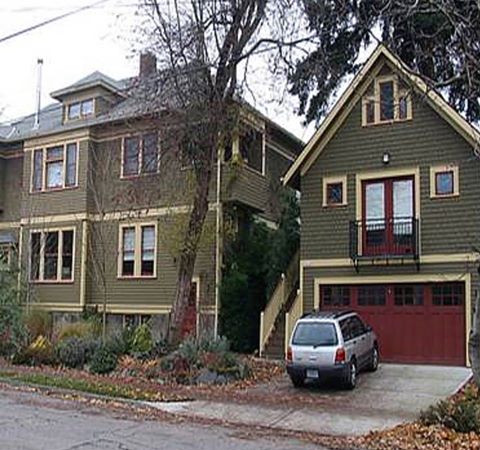Possible Changes in Ann Arbor’s Land Use Policies
by Wendy Carman
March 2021

There are some major changes being contemplated regarding the City of Ann Arbor's land use policies, some of which are likely to affect our neighborhood.
The City has at least postponed, if not dropped, their plans to engage in a comprehensive review of our Master Plan. That review would have included considerable public outreach but would have required a substantial investment of time and money. A major reason for this not taking place is likely the need to trim the City Budget because of the effect that COVID has had and will likely continue to have on tax revenues.
This has not stopped the City from pursuing major changes in ordinances that could cause important and lasting changes. Tracking those discussions is not easy. If one is not signed up to get regular updates from the Planning Department, your first notice about any of these changes might be seeing it on M-Live or reading their published announcement when notice of the first public hearing is posted 15 days before the hearing, in the Washtenaw Legal News (visit www.legalnews.com, click on Public Notice Quick Search, and type in "City of Ann Arbor PH")
The Planning Commission held Public Hearings on these two changes on March 2, 2021. The Short-Term Rental Ordinance was forwarded to the City Council with a recommendation for approval. A public hearing at City Council will be scheduled. Probably in April. The Accessory Dwelling Unit Ordinance was tabled until March 16th. If you are interested in receiving an update, please contact [email protected]
The three regulations discussed on February 23, 2021, included
- A change to the Short-Term Rental (STR) ordinance that would permit existing short term-rental companies that own non-owner-occupied houses in residential areas to continue to operate in perpetuity as legal non-conforming uses and the addition of a number of definitions new to the zoning ordinance that formalize a definition of a Principal Residence as any residence that has been leased to a tenant for as few as 31 days, e.g., allowing students to sublet their apartments as STRs. This issue becomes a bigger problem in that some Planning Commissioners expressed a wish to broaden rules to allow accessory dwelling units to be used as STRs. For more detailed information and instructions as to how to share any comments, please see the section below on Short Term Rentals
- A change to the Accessory Dwelling Unit (ADUs) regulations is proposed that would significantly expand the opportunities for building one 600-800 square ft on any residentially zoned property that has a single-family home on it. In addition, there is an expressed interest by some Planning Commission members to remove the requirement for a property to be owner occupied as to qualify for having an ADU, and a statement by the Planning Director indicated that he believes that, whether owner occupied or not, the city would permit a renter of an ADU to sub-let the ADU as an STR. For more detailed information and instructions as to how to share any comments, please see the section below on Potential Changes in the Accessory Dwelling Unit Regulations
- The Planning Department is working to create a new T1 zoning district that would allow high density development either residential, commercial or with a mixed-use option along all transit corridors, including Plymouth Rd. Details are still being debated; but, height limitations adjacent to existing residential uses might be limited to 8 stories, while they could otherwise be unlimited. While there are no details yet, there is an expectation that such a zoning district will have some depth to it from perhaps a city block to as deep as half a mile from the transit corridor. At the recent Planning Commission work session on February 9th, Staff brought forth a plan to implement such a zoning district around South State and Eisenhower and then modified those plans to fit the characteristics of other corridors with transit. Former Councilman Westphal who has been advocating for this approach for some time, initially discussed this potential ordinance as a new tool. However, he is now advocating for blanket rezoning of all corridors with buses. Such a broad-based change would usually come about only through a comprehensive Master Plan process.
Once specific details are agreed upon, public hearings will be held at Planning Commission and then at City Council. OHMHA will monitor this and post details and notices as information is available.
Short-Term Rentals
Ann Arbor has seen an increasing number of unregulated short-term rental (STR) homes, condos, and apartments, run by third party investors or absent owners. As these increased, there was an increase in citizen complaints regarding abuses, such as lack of safety, large parties, illegal activity, parking issues, threats to neighbors, garbage, and noise to name a few, tied to STRs. A group of aggrieved citizens organized and went to their Council members requesting help. The City funded a study by a local consultant and one of the revelations was that even though they could see advertisements for STRs in Ann Arbor by many companies like Airbnb and VRBO, they could not get an accurate estimate of the number of STRs operating in Ann Arbor. On September 8, 2020 Council approved new regulations that go into effect on March 1:
Short term rentals would be licensed and regulated by the City, effective March 1, 2021.
- Licensing would require payment of a fee and application that includes: address, type of property, number of bedrooms for rent, maximum permitted occupancy, and names, telephone numbers, and email addresses of two contact persons responsible for the Short-Term Rental Unit.
- A principal residence may be licensed as a short-term rental, either host-stays or whole house rental.
- A non-principal residence short-term rental will only be permitted in Mixed Use Zoning districts.
- See the MLIVE article: Ann Arbor Bans Dedicated Airbnb Short-term rental properties
Following this 2020 decision, businesses running non-owner occupied STRs in residential neighborhoods threatened suits against the City if we did not change the ordinance to grandfather them all in.
In response, the City is now proposing to add an amendment to the zoning ordinance, that reads:
A Non-Principal Residence Short-Term Rental established in a Residential Zoning District prior to March 1, 2021, shall be considered a legal nonconforming use and may continue and be maintained subject to Section 5.32.1.
And proposing to add these new definitions to our zoning ordinance:
- Permanent Resident- The person(s) occupying a dwelling unit as their Principal resident
- Principal Residence - The dwelling unit where an owner of the property or tenant of a period greater than 30 days has their true, fixed, and permanent home to which, whenever absent, they intend to return and that shall continue as principal residences until another principal residence is established.
- Short-Term Rental, Non-Principal Residence - Any dwelling unit that is not the owner’s Principal Residence, and is rented wholly or partly for compensation for periods of 30 consecutive days or less.
- Short-Term Rental – Principal Residence Homestay - Activity where Permanent Resident hosts visitors in their home, for compensation, for periods of 30 consecutive days or less, while the Permanent Resident lives on-site, in the same dwelling unit, throughout the visitor’s stay.
- Short-Term Rental – Principal Residence Whole House - Activity where permanent resident hosts visitors in their home, for compensation, for periods of 30 consecutive days or less, while the Permanent Resident is not present or occupied by the Permanent Resident, throughout the visitor’s stay.
If approved, the addition of these definitions and the creation of this non-conforming use will be the first mention of short-term rentals in the City’s Zoning Ordinance because all of the regulations of Short-Term rentals are currently only a part of Title VII Chapter 97.
Some of these changes may have unintended consequences. Click here for a table of Pros and Cons about this Short Term Rentals proposed amendment.
Potential Changes in the Accessory Dwelling Unit Regulations
An Accessory Dwelling Unit (ADU) is a second, smaller dwelling unit either developed inside an existing single-family house (such as in a basement, attic, or addition) or as part of an accessory structure (such as a converted garage or carriage house).
City Council approved amendments to the zoning ordinance on August 4, 2016, to allow ADUs in single-family residential zoning districts meeting certain requirements including that the primary house or the ADU must be owner-occupied.
The proposed changes to the ADU regulations passed in 2016 that are being discussed by Planning Commission now include:
- No longer requiring an ADU be designed so that the property still has the appearance of a single-family house
- No longer requiring any minimum lot size; allowing any residential lot with a building being used as a single-family house to have an ADU
- Permitting an ADU of up to 600 sq ft on any residential lot with less than 7200 Sq ft that is used as a single-family house. Lots with at least 7200 sq ft (similar in size to lots in the OHMHA) may have ADUs of up to 800 Sq ft.
- No longer requiring that detached ADUs be built in a legally conforming accessory building built before January 1, 2017 and now allowing newly constructed legally conforming ADUs.
- These ADUs they are a separate detached structure may be built in the rear or side yard if at least 3 ft from the rear or side lot line.
- Changes in the new definitions being placed in the Zoning Code because of STRs, may also affect who can have an ADU.
Because these changes are considered ”minor” changes to the City’s zoning code and not a rezoning, there will be no public notice targeted to the owners of lots with single family homes. However, this methodology results in effectively rezoning all single-family houses to a 2-family houses, with most of the public unaware of the change.
To learn more, https://www.a2gov.org/departments/planning/Pages/Accessory-Dwelling-Units.aspx
Letters can be sent to the Planning Commission through email to [email protected]
